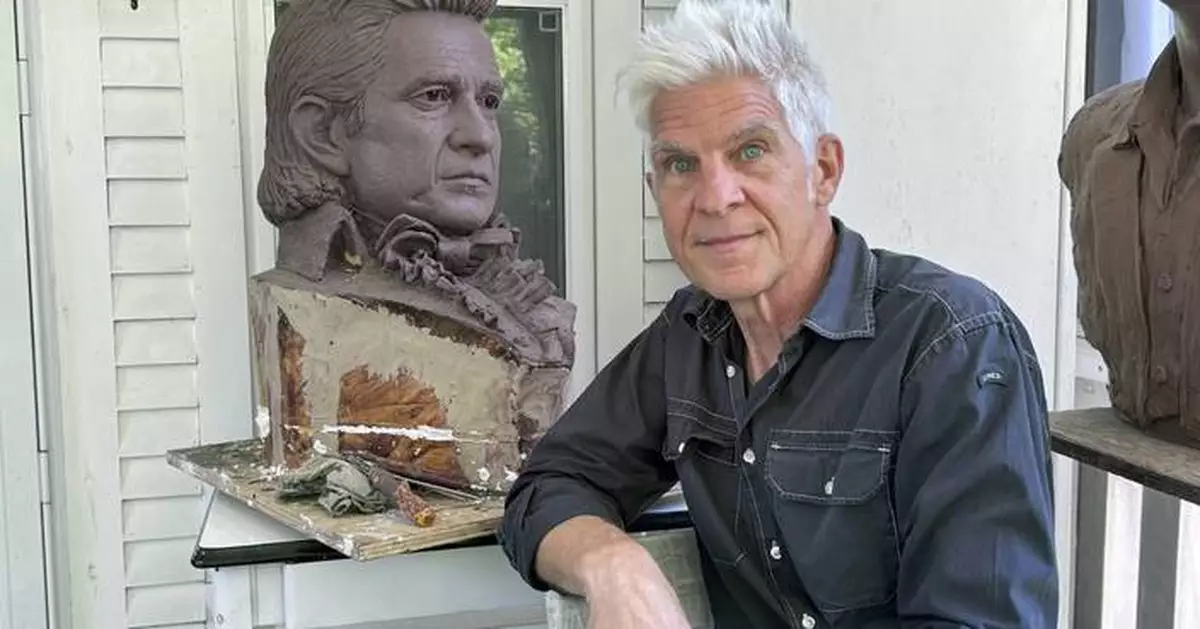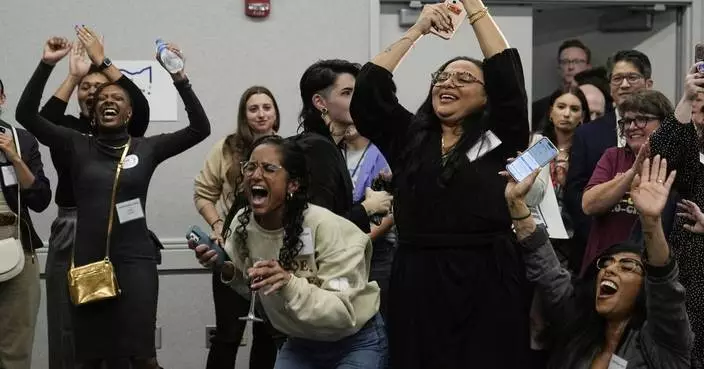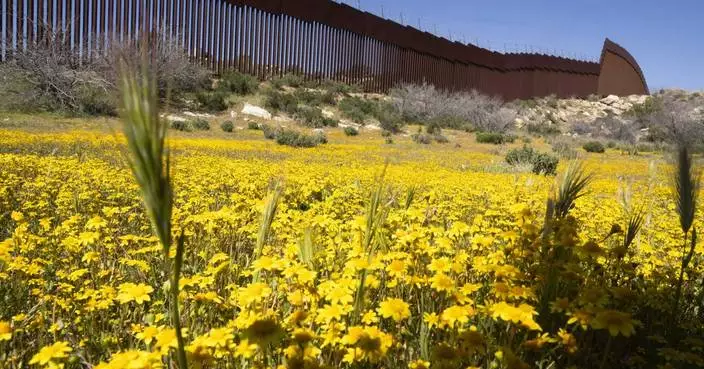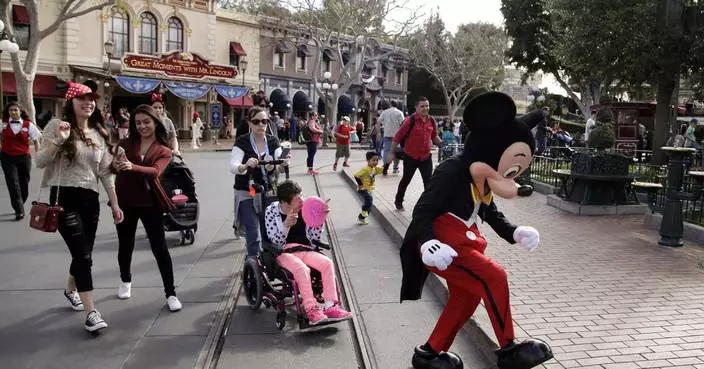LITTLE ROCK, Ark. (AP) — When Arkansas lawmakers decided five years ago to replace the statues representing the state at the U.S. Capitol, there was little objection to getting rid of the existing sculptures. The statues that had stood there for more than 100 years were obscure figures in the state's history.
“I remember giving tours to constituents from Arkansas, to young people, and I would point out the two representatives in Statuary Hall in our United States Capitol from Arkansas,” said former Gov. Asa Hutchinson, who also served in Congress. “And they would say, ‘We’ve never heard of them.’”
Click to Gallery
LITTLE ROCK, Ark. (AP) — When Arkansas lawmakers decided five years ago to replace the statues representing the state at the U.S. Capitol, there was little objection to getting rid of the existing sculptures. The statues that had stood there for more than 100 years were obscure figures in the state's history.
Former Arkansas Gov. Asa Hutchinson holds a small-scale statue of Johnny Cash, on April 23, 2024, in Little Rock, Ark. Artist Kevin Kresse's full sculpture of Cash will be unveiled at the U.S. Capitol as part of the Statuary Hall collection, later this year. (AP Photo/Andrew DeMillo)
Artist Kevin Kresse, works on a clay bust of Johnny Cash, April 23, 2024 in Little Rock, Ark. Kresse's full sculpture of Cash will be unveiled at the U.S. Capitol as part of the Statuary Hall collection, later this year. (AP Photo/Mike Pesoli)
Artist Kevin Kresse, works on a clay bust of Johnny Cash, April 23, 2024 in Little Rock, Ark. Kresse's full sculpture of Cash will be unveiled at the U.S. Capitol as part of the Statuary Hall collection, later this year. (AP Photo/Mike Pesoli)
Benjamin Victor works on his sculpture of Daisy Gatson Bates at the Windgate Center of Art and Design at the The University of Arkansas at Little Rock campus on Monday, April 25, 2022, in Little Rock, Ark. The statue will be placed in the Statuary Hall in the United States Capitol when it is completed. (Stephen Swofford/Arkansas Democrat-Gazette via AP)
Artist Kevin Kresse, is shown with a clay bust of Johnny Cash, April 23, 2024 in Little Rock, Ark. Kresse's full sculpture of Cash will be unveiled at the U.S. Capitol as part of the Statuary Hall collection, later this year. (AP Photo/Mike Pesoli)
Instead of two little-known figures from the 18th and 19th centuries, the state will soon be represented by the “Man in Black” and a woman who was instrumental in the fight over school desegregation.
Officials plan to install statues of civil rights leader Daisy Bates this week and musician Johnny Cash later this year.
Bates, who headed the state NAACP, mentored the Black students known as the Little Rock Nine who integrated Central High School in 1957. She is a well-known civil rights figure in Arkansas, where a downtown street in the capital, Little Rock, is named in her honor. The state also marks Daisy Bates Day on Presidents Day.
Benjamin Victor, the Idaho sculptor who was chosen to create the statue of Bates, said he began his work by extensively studying her, including reading her 1962 autobiography and visiting her Little Rock home and Central High. He said he hopes the statue will help U.S. Capitol visitors learn more about her as well.
“I hope it really first and foremost inspires them to study Daisy Bates' life and legacy,” Victor said. “A big part of it is to capture that spirit of hers and inspire others to do the same and stand up for what’s right.”
The 8-foot tall bronze statue depicts Bates, who with her husband published the Arkansas State Press newspaper, walking with a newspaper in her arm. She holds a notebook and pen in one hand and wears a NAACP pin and rose on her lapel.
Cash was born in Kingsland, a tiny town about 60 miles (100 kilometers) south of Little Rock. He died in 2003 at age 71. His achievements include 90 million records sold worldwide spanning country, rock, blues, folk and gospel. He was among the few artists inducted into both the Country Music Hall of Fame and Rock & Roll Hall of Fame.
The 8-foot (2.4-meter) tall statue of Cash depicts the singer with a guitar slung across his back and a Bible in his hand. Little Rock sculptor Kevin Kresse, who was selected to create the statue, has sculpted other musical figures from Arkansas such as Al Green, Glen Campbell and Levon Helm.
Kresse views Cash as a much-needed addition to the Capitol as a counterbalance to the conflict in Congress, he said.
“He walked the walk and he lived what he believed. And that was just this quality that really appealed to me,” Kresse said. “And that interior thoughtfulness was something that I really wanted to try to bring out in this sculpture.”
The Bates and Cash statues will replace ones depicting James P. Clarke, a former governor and U.S. senator in the late 1800s and early 1900s, and Uriah Rose, a 19th century attorney. The statues had come under scrutiny, especially over racist comments Clarke made calling on the Democratic Party to preserve “white standards.”
Republican Sen. Bart Hester, a Republican who is now the Senate president pro tem, began calling for the statues to be replaced in 2018. Clarke Tucker, Clarke's great-great-grandson and a Democratic state senator, also called for his ancestor's statue to come down.
“There was recognition broadly that it was time for a change,” said Hutchinson, who signed the 2019 law requiring the Bates and Cash statues to go up.
Choosing their replacements was the hard part, with lawmakers offering competing ideas ranging from Walmart founder Sam Walton to a Navy SEAL from the state who was killed in Afghanistan. After some wrangling, lawmakers eventually approved Bates and Cash.
Sen. David Wallace, who sponsored the legislation to replace the previous sculptures, said he hoped the new statues would tell people more about the types of figures Arkansas has produced over the years.
“We wanted to do the common person that represented Arkansas,” Wallace said. “And I think that with Daisy Bates and with Johnny Cash, we covered the spectrum in Arkansas. Just, they represent the common folks of Arkansas.”
Associated Press reporter Mike Pesoli contributed to this report.
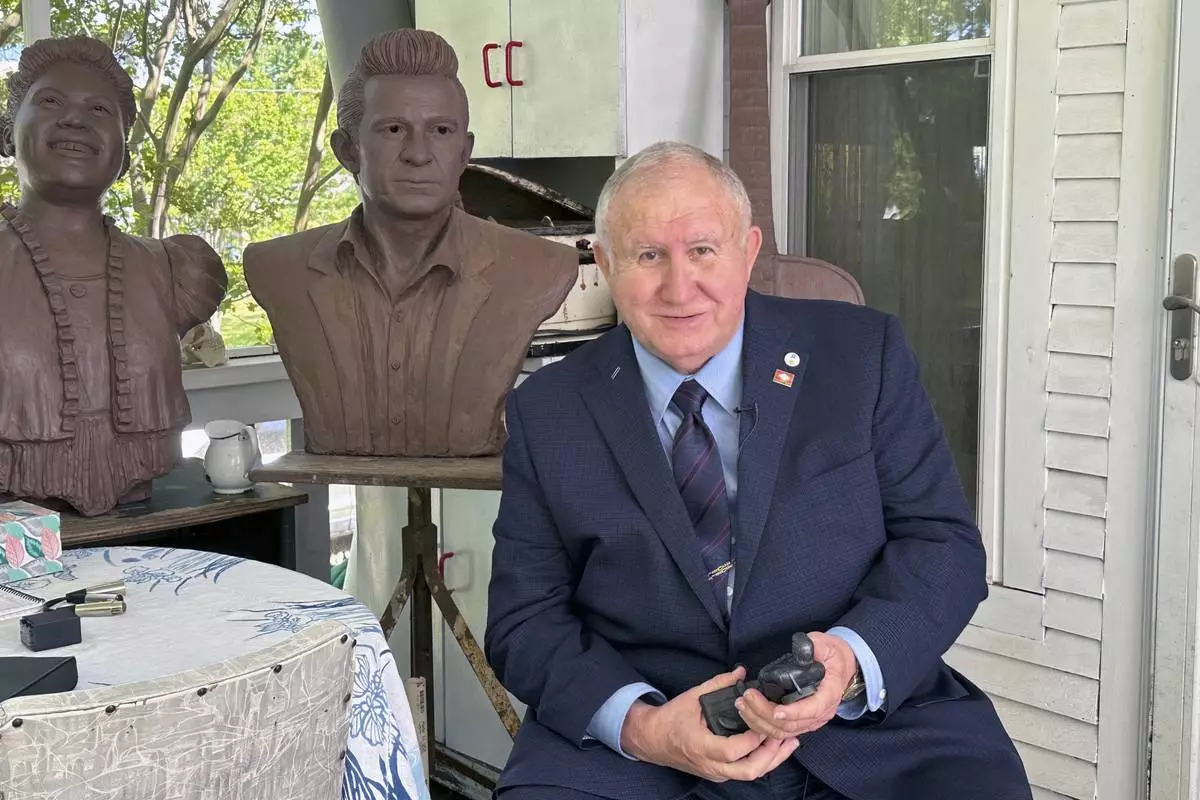
Arkansas State Sen. David Wallace holds a small-scale statue of Johnny Cash, on April 23, 2024, in Little Rock, Ark. Artist Kevin Kresse's full sculpture of Cash will be unveiled at the U.S Capitol as part of the Statuary Hall collection, later this year. (AP Photo/Andrew DeMillo)
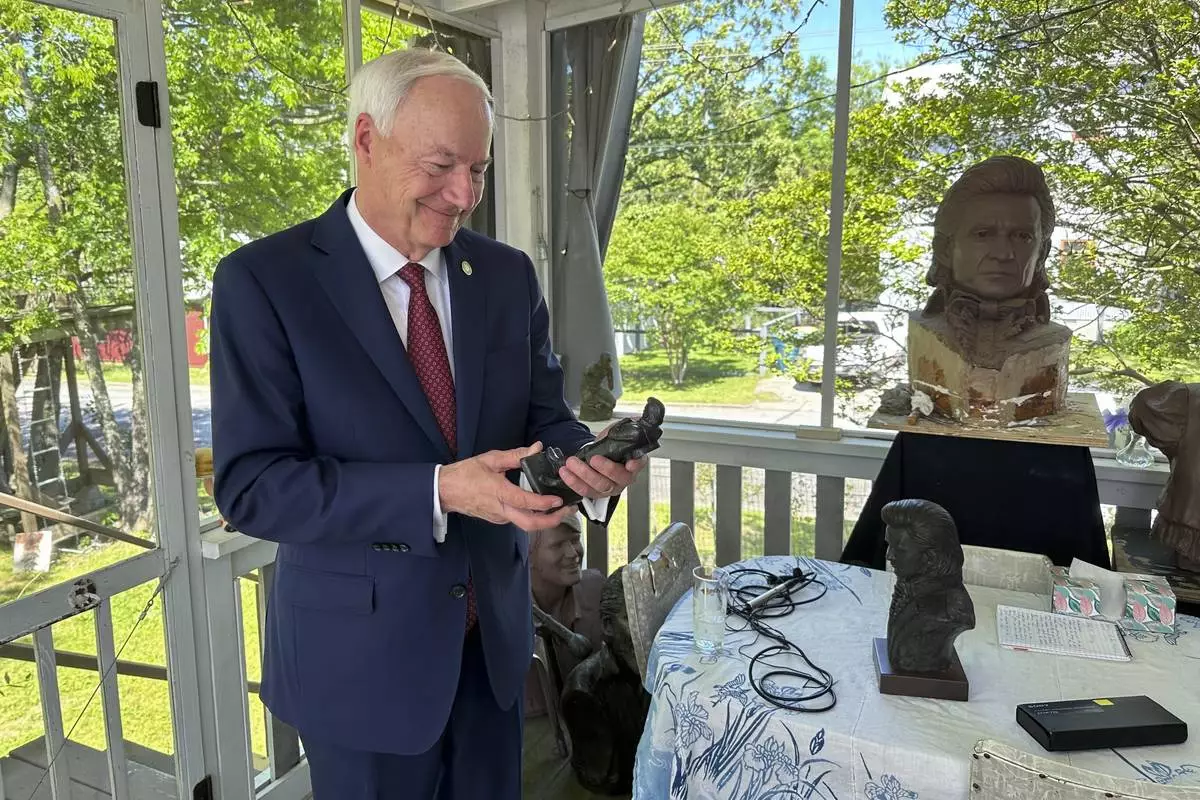
Former Arkansas Gov. Asa Hutchinson holds a small-scale statue of Johnny Cash, on April 23, 2024, in Little Rock, Ark. Artist Kevin Kresse's full sculpture of Cash will be unveiled at the U.S. Capitol as part of the Statuary Hall collection, later this year. (AP Photo/Andrew DeMillo)
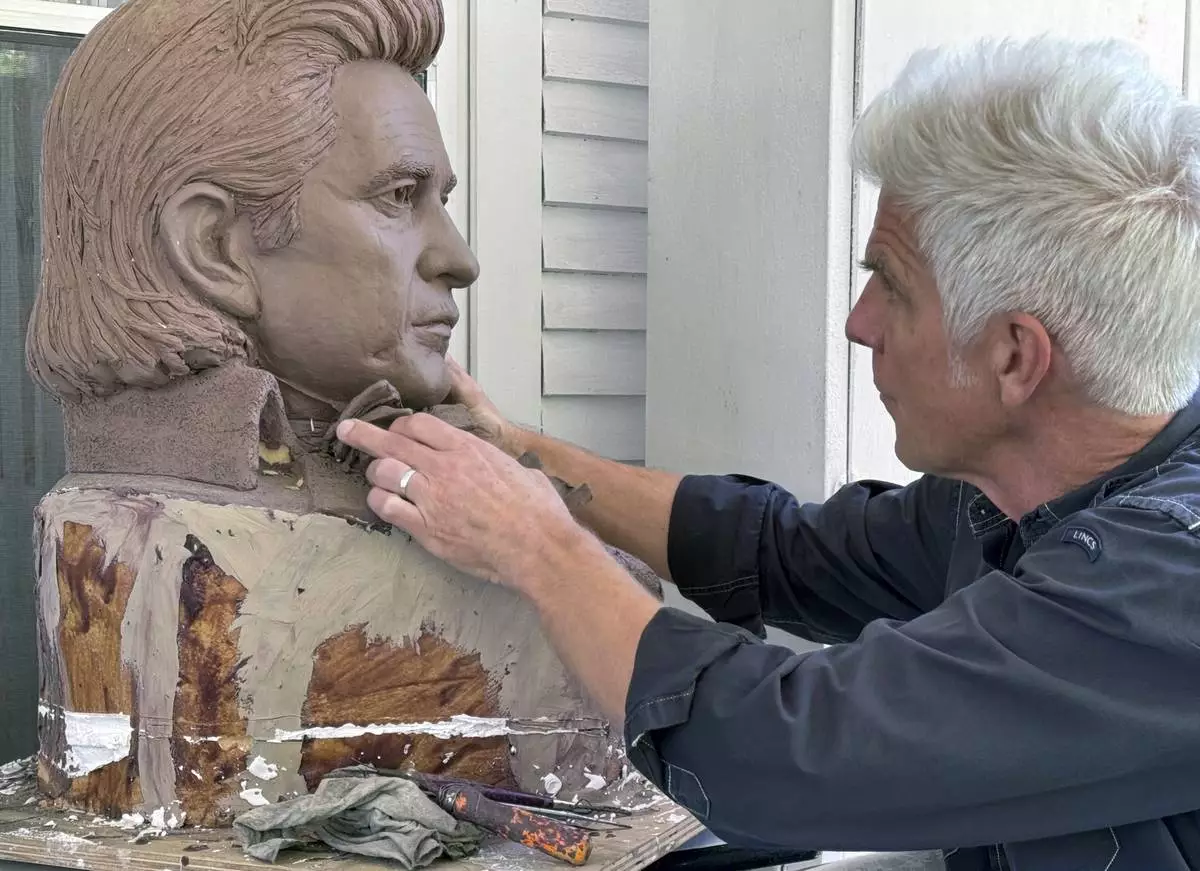
Artist Kevin Kresse, works on a clay bust of Johnny Cash, April 23, 2024 in Little Rock, Ark. Kresse's full sculpture of Cash will be unveiled at the U.S. Capitol as part of the Statuary Hall collection, later this year. (AP Photo/Mike Pesoli)
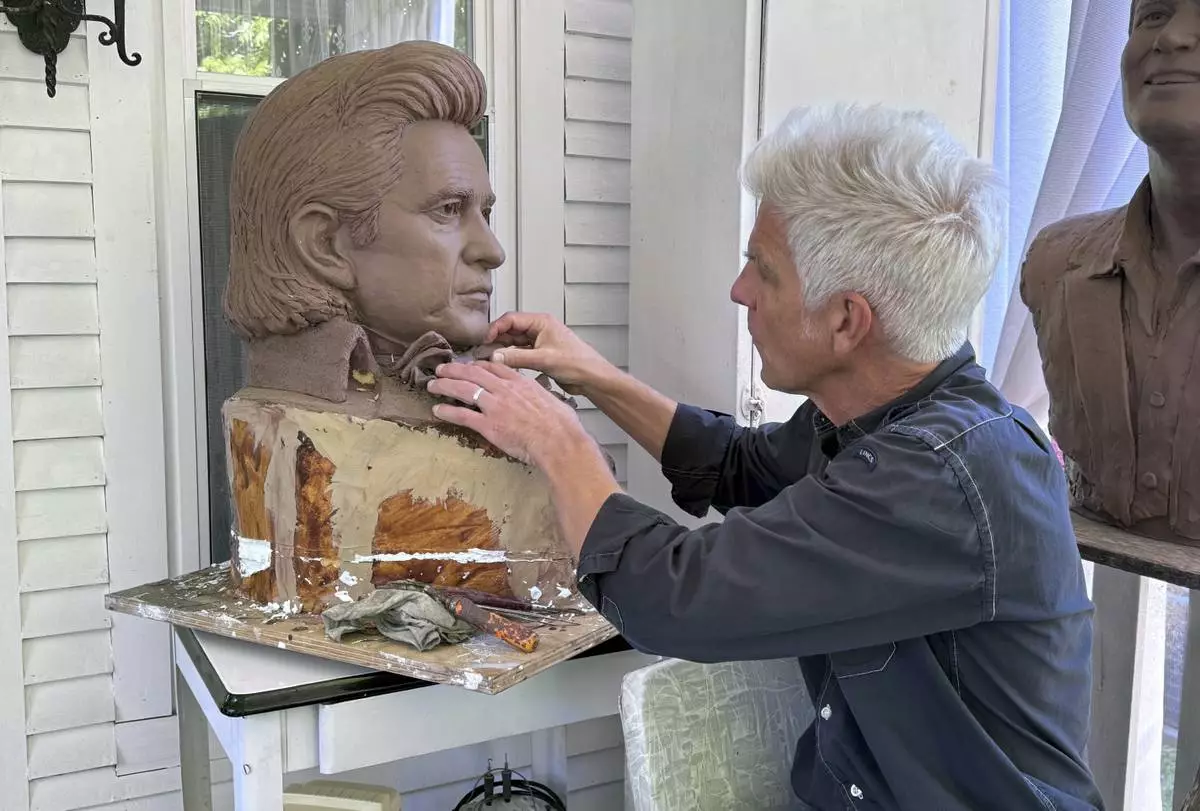
Artist Kevin Kresse, works on a clay bust of Johnny Cash, April 23, 2024 in Little Rock, Ark. Kresse's full sculpture of Cash will be unveiled at the U.S. Capitol as part of the Statuary Hall collection, later this year. (AP Photo/Mike Pesoli)
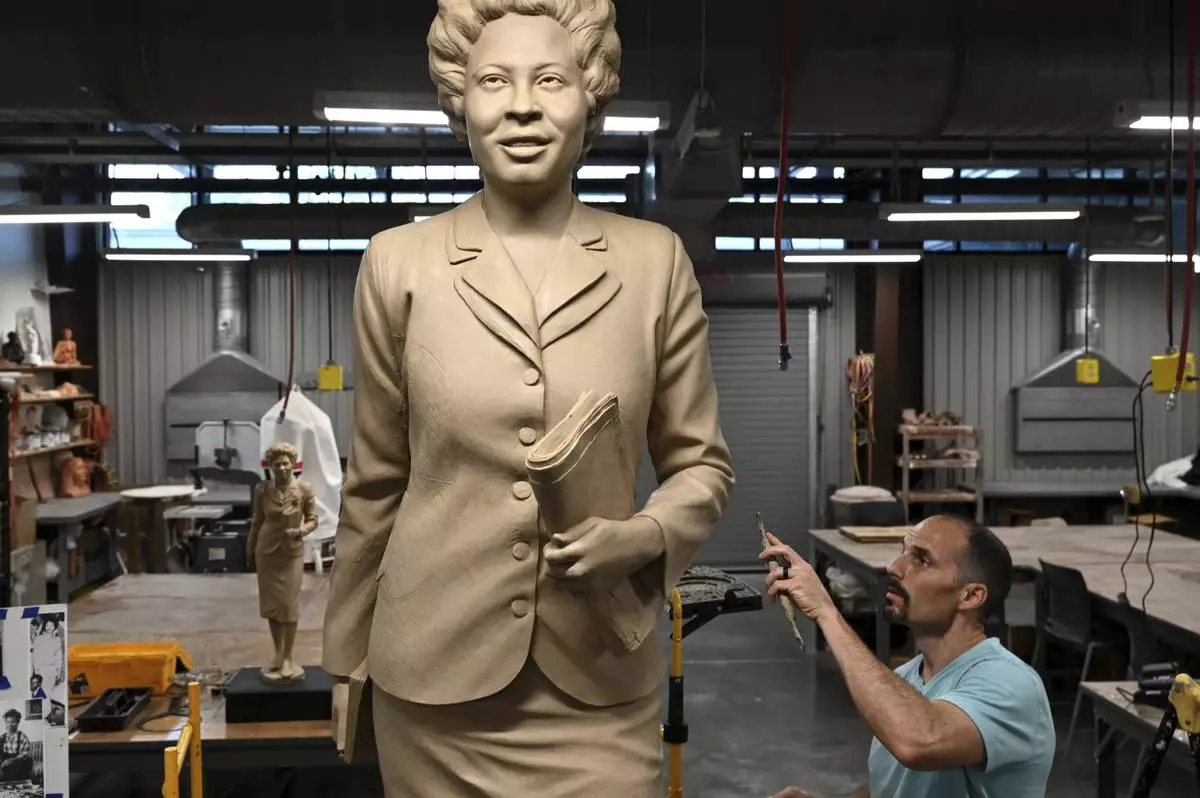
Benjamin Victor works on his sculpture of Daisy Gatson Bates at the Windgate Center of Art and Design at the The University of Arkansas at Little Rock campus on Monday, April 25, 2022, in Little Rock, Ark. The statue will be placed in the Statuary Hall in the United States Capitol when it is completed. (Stephen Swofford/Arkansas Democrat-Gazette via AP)
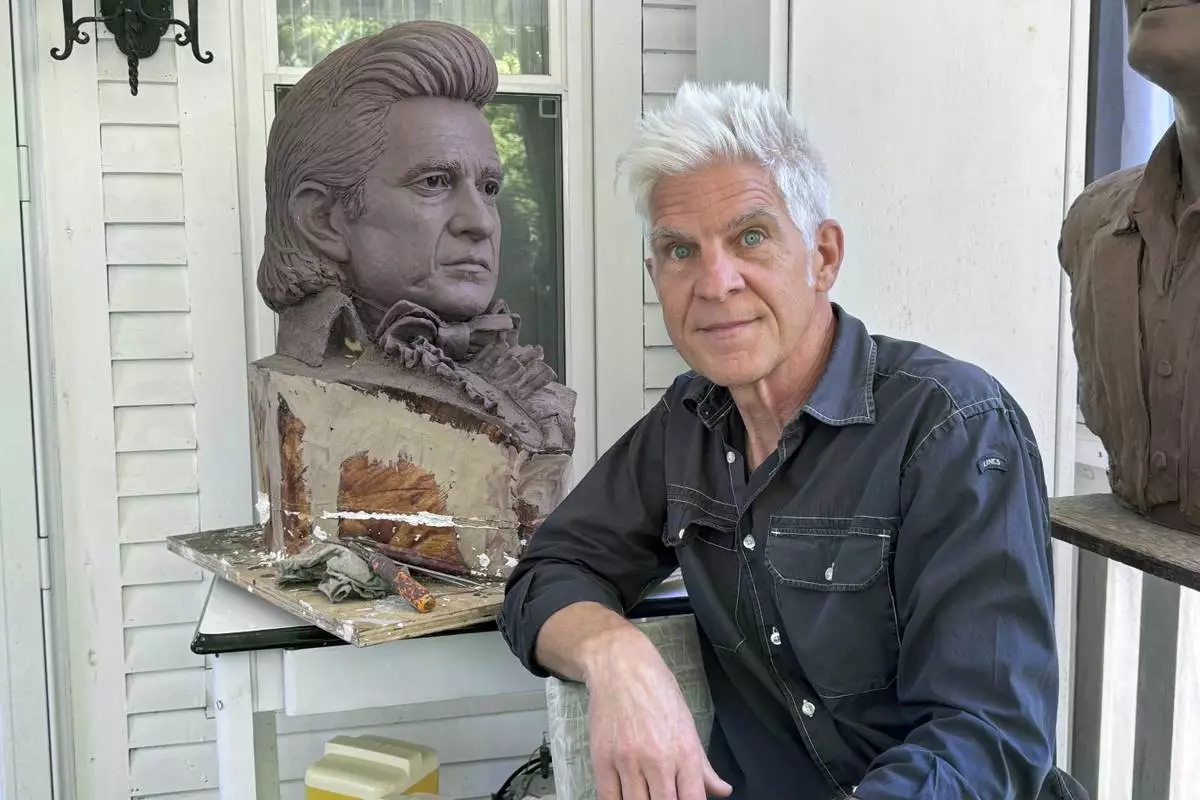
Artist Kevin Kresse, is shown with a clay bust of Johnny Cash, April 23, 2024 in Little Rock, Ark. Kresse's full sculpture of Cash will be unveiled at the U.S. Capitol as part of the Statuary Hall collection, later this year. (AP Photo/Mike Pesoli)
ACCRA, Ghana (AP) — Anita Akpeere prepared fried rice in her kitchen in Ghana's capital as a flurry of notifications for restaurant orders lit up apps on her phone. “I don’t think I could work without a phone in my line of business,” she said, as requests came in for her signature dish, a traditional fermented dumpling.
Internet-enabled phones have transformed many lives, but they can play a unique role in sub-Saharan Africa, where infrastructure and public services are among the world's least developed, said Jenny Aker, a professor who studies the issue at Tufts University. At times, technology in Africa has leapfrogged gaps, including providing access to mobile money for people without bank accounts.
Despite growing mobile internet coverage on the continent of 1.3 billion people, just 25% of adults in sub-Saharan Africa have access to it, according to Claire Sibthorpe, head of digital inclusion at the U.K.-based mobile phone lobbying group GSMA. Expense is the main barrier. The cheapest smartphone costs up to 95% of the monthly salary for the poorest 20% of the region's population, Sibthorpe said.
Literacy rates that are below the global average, and lack of services in many African languages — some 2,000 are spoken across the continent, according to The African Language Program at Harvard University — are other reasons why a smartphone isn't a compelling investment for some.
"If you buy a car, it’s because you can drive it," said Alain Capo-Chichi, chief executive of CERCO Group, a company that has developed a smartphone that functions through voice command and is available in 50 African languages such as Yoruba, Swahili and Wolof.
Even in Ghana, where the lingua franca is English, knowing how to use smartphones and apps can be a challenge for newcomers.
One new company in Ghana is trying to close the digital gap. Uniti Networks offers financing to help make smartphones more affordable and coaches users to navigate its platform of apps.
For Cyril Fianyo, a 64-year-old farmer in Ghana’s eastern Volta region, the phone has expanded his activities beyond calls and texts. Using his identity card, he registered with Uniti, putting down a deposit worth 340 Ghanaian Cedis ($25) for a smartphone and will pay the remaining 910 Cedis ($66) in installments.
He was shown how to navigate apps that interested him, including a third-party farming app called Cocoa Link that offers videos of planting techniques, weather information and details about the challenges of climate change that have affected cocoa and other crops.
Fianyo, who previously planted according to his intuition and rarely interacts with farming advisors, was optimistic that the technology would increase his yields.
“I will know the exact time to plant because of the weather forecast,” he said.
Kami Dar, chief executive of Uniti Networks, said the mobile internet could help address other challenges including accessing health care. The company has launched in five communities across Ghana with 650 participants and wants to reach 100,000 users within five years.
Aker, the scholar, noted that the potential impact of mobile phones across Africa is immense but said there is limited evidence that paid health or agriculture apps are benefiting people there. She asserted that the only beneficial impacts are reminders to take medicine or get vaccinated.
Having studied agricultural apps and their impact, she said it doesn't seem that farmers are getting better prices or improving their income.
Capo-Chichi from CERCO Group said a dearth of useful apps and content is another reason why more people in Africa aren't buying smartphones.
Dar said Uniti Networks learns from mistakes. In a pilot in northern Ghana designed to help cocoa farmers contribute to their pensions, there was high engagement but farmers didn’t find the app user-friendly and needed extra coaching. After the feedback, the pension provider changed the interface to improve navigation.
Others are finding benefit with Uniti's platform. Mawufemor Vitor, a church secretary in Hohoe, said one health app has assisted her to track her menstruation to help prevent pregnancy. And Fianyo, the farmer, has used the platform to find information on herbal medicine.
But mobile phones are no substitute for investment in public services and infrastructure, Aker said.
She also expressed concerns about the privacy of data in the hands of private technology providers and governments. With digital IDs in development in African nations such as Kenya and South Africa, this could pave the way for further abuses, Aker said.
Uniti Networks is a for-profit business, paid for each customer that signs up for paying apps. Dar asserted that he was not targeting vulnerable populations to sell them unnecessary services and said Uniti only features apps that align with its idea of impact, with a focus on health, education, finance and agriculture.
Dar said Uniti has rejected lucrative approaches from many companies including gambling firms. “Tech can be used for awful things,” he said.
He acknowledged that Uniti tracks users on the platform to provide incentives, in the form of free data, and to provide feedback to app developers. He acknowledged that users' health and financial data could be at threat from outside attack but said Uniti has decentralized data storage in an attempt to lessen the risk.
Still, the potential to provide solutions can outweigh the risks, Aker said, noting two areas where the technology could be transformative: education and insurance.
She said mobile phones could help overcome the illiteracy that still affects 773 million people worldwide according to UNESCO. Increased access to insurance, still not widely used in parts of Africa, could provide protection to millions who face shocks on the front lines of climate change and conflict.
Back in Fianyo's fields, his new smartphone has attracted curiosity. “This is something I would like to be part of," said neighboring farmer Godsway Kwamigah.
Thompson reported from Dakar, Senegal.
The Associated Press receives financial support for global health and development coverage in Africa from the Bill & Melinda Gates Foundation Trust. The AP is solely responsible for all content. Find AP’s standards for working with philanthropies, a list of supporters and funded coverage areas at AP.org.

Shadrach Damateye, a co-founder of Masters Hive Center for Innovation, who uses his mobile phone to help business owners, poses for a photograph outside his office in Tema, Ghana, Tuesday, April 23, 2024. Internet-enabled phones can play a unique role in sub-Saharan Africa, where infrastructure and public services are among the world’s least developed. But despite growing mobile internet coverage on the continent of 1.3 billion people, just 25% of adults in sub-Saharan Africa currently have access to it. (AP Photo/Misper Apawu)

A man asks questions during a mobile app training session at the market in Hohoe, Ghana, Wednesday, April 18, 2024. Internet-enabled phones can play a unique role in sub-Saharan Africa, where infrastructure and public services are among the world’s least developed. But despite growing mobile internet coverage on the continent of 1.3 billion people, just 25% of adults in sub-Saharan Africa currently have access to it. (AP Photo/ Misper Apawu)

Rita Quansah, right, from Uniti Networks, coaches farmers on how to navigate its platform of applications, from pensions that encourage saving to agriculture apps, at a market in Hohoe, Ghana, Wednesday, April 18, 2024. (AP Photo/ Misper Apawu)

Rita Quansah, left, from Uniti Networks, coaches farmers on how to navigate its platform of applications, from pensions that encourage saving to agriculture apps, at a market in Hohoe, Ghana, Wednesday, April 18, 2024. Internet-enabled phones can play a unique role in sub-Saharan Africa, where infrastructure and public services are among the world’s least developed. But despite growing mobile internet coverage on the continent of 1.3 billion people, just 25% of adults in sub-Saharan Africa currently have access to it. (AP Photo/Misper Apawu)

Rita Quansah, center, from Uniti Networks, coaches farmers on how to navigate its platform of application, from pensions that encourage saving to agriculture apps, at a market in Hohoe, Ghana, Wednesday, April 18, 2024. Uniti Networks offers financing to help make smartphones more affordable and coaches users to navigate its platform of apps. (AP Photo/ Misper Apawu)

Cyril Fianyo, a farmer and beneficiary under the Uniti Networks project, shows a message he received on his phone at his farm in Atabu, Hohoe, in Ghana's Volta region, Wednesday, April 18, 2024. Internet-enabled phones have transformed many lives, but they can play a unique role in sub-Saharan Africa, where infrastructure and public services are among the world's least developed. (AP Photo/Misper Apawu)

Mawufemor Vitor, a beneficiary under Uniti Networks, poses for a photograph in Hohoe, Ghana, Wednesday, April 18, 2024. Vitor, a church secretary, said a health app on Uniti's platform, has assisted her to track her menstruation to help prevent pregnancy. Despite growing mobile internet coverage on the continent of 1.3 billion people, just 25% of adults in sub-Saharan Africa have access to it. (AP Photo/Misper Apawu)

Cyril Fianyo, a farmer and a beneficiary under the Uniti Networks project, holds the phone he uses to check the weather and learn about agricultural practices at his farm in Atabu, Hohoe, in Ghana's Volta region, Wednesday, April 18, 2024. Uniti Networks offers financing to help make smartphones more affordable and coaches users to navigate its platform of apps. For Fianyo, who previously planted according to his intuition and rarely interacts with farming advisors, the phone has expanded his activities beyond calls and texts. “I will know the exact time to plant because of the weather forecast,” he said. (AP Photo/ Misper Apawu)

Rita Quansah, right, from Uniti Networks, shows farmer Cyril Fianyo, 64, years, how to navigate the farmers' apps on his phone in Atabu, Hohoe, in Ghana's Volta Region, Wednesday, April 18, 2024. Fianyo, who previously planted according to his intuition and rarely interacts with farming advisors, was optimistic that the technology would increase his yields. “I will know the exact time to plant because of the weather forecast,” he said. (AP Photo/ Misper Apawu)

Anita Akpeere, who uses her mobile phone to run her business, stands outside her restaurant in Accra, Ghana, Tuesday, April 23, 2024. ( AP Photo/ Misper Apawu)

Anita Akpeere checks customer food orders on her mobile phone inside her restaurant in Accra, Ghana, Tuesday, April 23, 2024. Internet-enabled phones can play a unique role in sub-Saharan Africa, where infrastructure and public services are among the world’s least developed. But despite growing mobile internet coverage on the continent of 1.3 billion people, just 25% of adults in sub-Saharan Africa currently have access to it. (AP Photo/ Misper Apawu)

Anita Akpeere, who uses her mobile phone to run her business, stands inside her restaurant in Accra, Ghana, Tuesday, April 23, 2024. (AP Photo/ Misper Apawu)

Anita Akpeere, who uses her mobile phone to run her business, prepares food at her restaurant in Accra, Ghana, Tuesday, April 23, 2024. While preparing the food in Ghana's capital a flurry of notifications for restaurant orders lit up apps on her phone. “I don’t think I could work without a phone in my line of business,” she said, as requests came in for her signature dish, a traditional fermented dumpling. (AP Photo/Misper Apawu)








